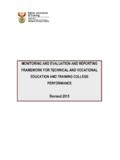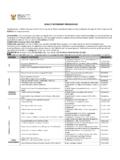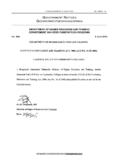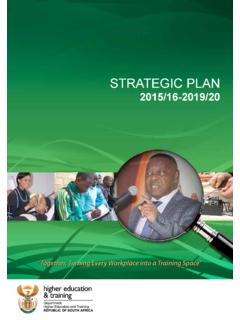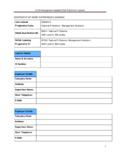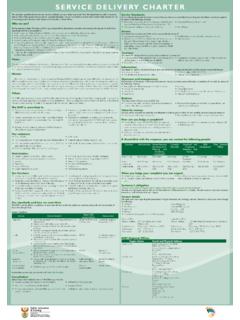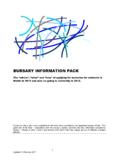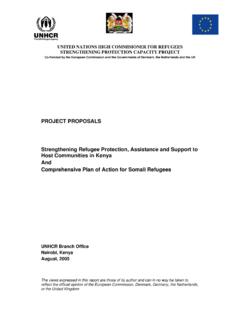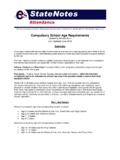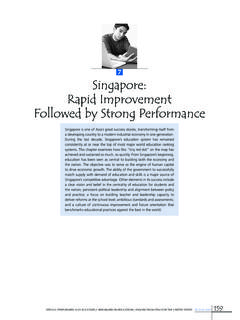Transcription of TVET CURRICULUM INSTRUCTION
1 NC(V) ICASS Guidelines January 2022 1 Department of Higher education and Training TVET CURRICULUM INSTRUCTION INTERNAL CONTINUOUS ASSESSMENT (ICASS) GUIDELINES FOR THE NC(V) QUALIFICATIONS IMPLEMENTATION: JANUARY 2022 2 Department of Higher education and Training FOREWORD The Department of Higher education and Training (DHET) would like to thank and congratulate all Technical and vocational education and Training (TVET) colleges who have complied with all Internal Continuous Assessments (ICASS) requirements. However, findings gathered during monitoring, moderation and verification visits to individual campuses by both the Department and Umalusi have generated great concern about the quality and the integrity of the ICASS component of the National Certificate ( vocational ) qualifications at some of the TVET Colleges.
2 In some instances, it is clear that the ICASS component is not taken seriously by lecturers and/or students. For a NC(V) student to receive the complete subject result for Fundamental subjects the marks of two components are compulsory: - ICASS Examination To be resulted for vocational subjects, the marks of three components are compulsory: - ICASS ISAT (Integrated Summative Assessment Task) Examination The ICASS component is therefore one of the compulsory components of assessment in the resulting process. If any one or more of the compulsory components is not fulfilled, the student will receive an incomplete subject result.
3 The successful delivery and integrity of the NC(V) qualification therefore requires proper administration, management, conduct, recording and reporting of student performance in the tasks making up the ICASS component. The quality assurance ( moderation, monitoring and verification) mechanisms inherent in the ICASS assessment process serve to strengthen its credibility and thereby the credibility of the qualification. To provide subject lecturers with support on the implementation of the ICASS component, the Department has revised the ICASS guidelines and published this revised version for implementation in all subjects offered on NC(V) Levels 2, 3 and 4 with effect from 1 January 2021.
4 The NC(V) policy requires an achievement of a sub-minimum for internal and external assessments and relates to the ICASS and ISAT components. The required achievement percentages are: All vocational subjects: 50% Life Orientation and the First Additional Languages: 40% Mathematics and Mathematical Literacy: 30%. The first implication of this is that a student must comply with the sub-minimum in both the external and internal assessment components. The second implication is that both external and internal components must be completed in the same academic year. 3 Department of Higher education and Training Whilst the ISAT mark is valid for a period of three years to complete a qualification, according to paragraph 10 (8) of the National Policy on the Conduct, Administration and Management of the Assessment of the National Certificate ( vocational ), 2007, the ICASS mark is valid up to the first supplementary examinations immediately following the November examinations.
5 A student who failed has to redo all the ICASS tasks for that subject. No marks given for ICASS tasks from a previous year may be transferred to the next academic year. Feedback from industry echoed the need to provide more prominence to the practical aspects of the NC(V) syllabi. The development of standardised practical assessment tasks is thus a major step in the right direction to ensure a uniform standard across institutions and to improve the chances of employment of NC(V) graduates. Practical assessments form part of both the ICASS and ISAT tasks of the NC(V) qualification.
6 Two of the five ICASS assessments of vocational subjects are practical in nature and make up 50% of the ICASS mark which represents 25% of the final subject mark. Since a high premium is placed on these practical assessments vis- -vis access to the workplace, the two practical assessment tasks forming part of the ICASS have now been standardised for levels 3 and 4 to ensure a uniform standard across institutions and to improve the chances of employment of NC(V) graduates. These two practical ICASS assessments must be used as the two practical marks of the ICASS task. NB: In cases of discrepancy, these ICASS guidelines supersede Subject and Assessment Guidelines of each subject in the NC(V).
7 The Department of Higher education and Training wishes you success in the planning, teaching and assessment of the ICASS component and encourages you to strive towards best practise in all aspects of ICASS implementation. Mr S Zungu Deputy Director-General Technical and vocational education and Training Date NC(V) ICASS Guidelines January 2022 4 Department of Higher education and Training Contents Page 1. INTRODUCTION 5 2.
8 PLANNING FOR ICASS 6 3. THE ICASS COMPONENT 6 4. SETTING OF ICASS TASKS 8 5. SETTING OF ASSESSMENT TOOLS 11 6. MODERATION OF ICASS TASKS 13 7. RECORDING OF ICASS MARKS 14 8. PORTFOLIOS 15 9. MONITORING OF IMPLEMENTATION 19 10. CONCLUSION 20 ANNEXURES: A EXAMPLE OF A SUBJECT ASSESSMENT PLAN 21 B EXAMPLE OF A SUBJECT ASSESSMENT SCHEDULE FOR STUDENTS 22 C ICASS TASKS FOR FUNDAMENTAL SUBJECTS 23 D ICASS TASKS FOR vocational SUBJECTS 30 E ANALYSIS GRID AND CHECKLIST FOR SETTING OF ICASS TASKS 33 F EXAMPLES OF ASSIGNMENTS FOR ICASS TASKS 34 G EXAMPLE OF A RUBRIC 35 H PRE-ASSESSMENT MODERATION PROCESS AND CHECKLIST 37 I POST-ASSESSMENT MODERATION PROCESS AND CHECKLIST 42 J EXAMPLES OF RECORD SHEETS FOR ICASS TASKS 45 K EXAMPLES OF MONITORING REPORT TEMPLATES 52 L CONSOLIDATED RECORD OF PERFORMANCE 54 M ICASS IRREGULARITY REGISTER 55 NC(V)
9 ICASS Guidelines January 2022 5 Department of Higher education and Training 1. INTRODUCTION This document provides guidelines for a common approach to the management, administration and implementation of the Internal Continuous Assessment (ICASS) component of all subjects offered across Levels 2, 3 and 4 in the National Certificates ( vocational ) (NC(V)) qualification. ICASS provides the opportunity to assess students on an ongoing basis in the normal teaching and learning environment, beyond the constraints of an examination process. It is integral in supporting the teaching and learning process.
10 Both the student and the subject lecturer are able to evaluate student progress and determine whether remedial interventions are needed. These ICASS Guidelines should be read in conjunction with the relevant NC(V) Subject Guidelines and Assessment Guidelines and the National Policy on the Conduct, Administration and Management of the Assessment of the National Certificate ( vocational ), 2007. TVET Colleges are expected to: develop a policy for internal assessment to cover all aspects in the complete assessment process (including amongst others procedures for student appeals and irregularities according to Annexure D (3) of the National Policy on the Conduct, Administration and Management of the Assessment of the National Certificate ( vocational ), 2007); compile an annual ICASS assessment plan and schedule for each NC(V) subject offered by the college; design and moderate suitable assessment tasks and tools.
